MH17 bodies leave Ukraine rebel area and reach Kharkiv
- Published
Tim Willcox in Kiev says it is a "very traumatic time" for relatives of the victims
A train carrying the remains of victims of the Malaysian airliner which crashed in Ukraine has arrived in the city of Kharkiv, outside rebel territory.
Flight MH17 crashed in an area held by pro-Russia rebels last Thursday, killing all 298 people on board.
However, 200 bodies arrived in Kharkiv - not 282 as claimed by the rebels, Dutch officials said.
Meanwhile, international monitors say parts of the wreckage have been changed and cut into since they first saw them.
Western nations say there is growing evidence the rebels shot down the plane using a missile supplied by Russia.
Russia has suggested Ukrainian government forces are to blame.
Hope for clues
Most of those who died in the crash of the Malaysia Airlines Boeing 777 were Dutch, and the first remains are due to be flown from Kharkiv to the Dutch city of Eindhoven on Wednesday.
From there, they will go to a facility in the Dutch city of Hilversum for identification - a process which could take months, Dutch Prime Minister Mark Rutte said.
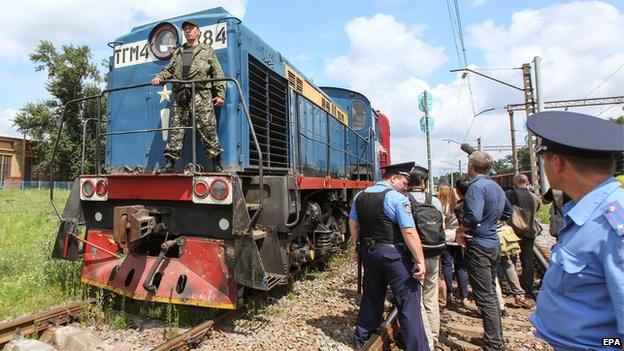
The train carrying the bodies from the MH17 crash site arrived in Kharkiv on Tuesday
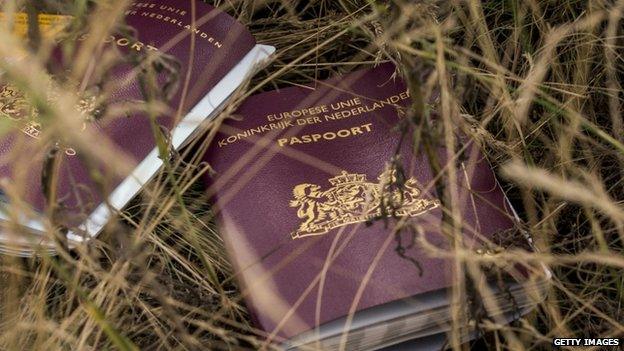
A majority of those who died were Dutch nationals
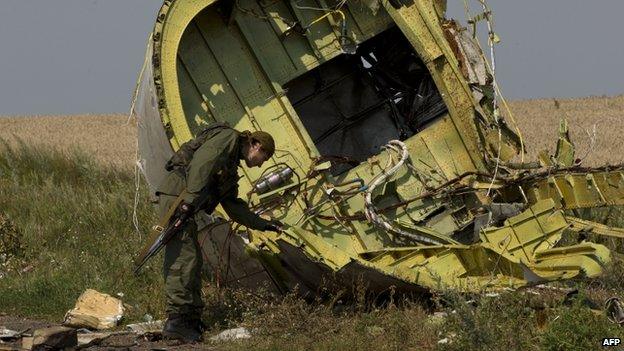
Experts have expressed concern that forensic evidence at the crash site could be lost
The bodies will be kept in refrigerated rail carriages in Kharkiv while they are being prepared for transport, a spokeswoman for the Dutch forensics team has said.
Countries directly affected by the disaster, such as the Netherlands, Australia, and the UK, have been concerned that the crash site was not properly sealed off, with the risk that valuable evidence could be put at risk.
The plane's "black box" flight recorders, which were handed over by rebels to Malaysian officials, will be flown to a laboratory in the UK for analysis, British Prime Minister David Cameron has confirmed.
Investigators hope the devices, described as being in good condition, will provide clues about what happened to the plane.
Floral tributes are mounting up outside Amsterdam's Schiphol Airport, reports the BBC's Anna Holligan

Analysis: Jonathan Sumberg, BBC transport reporter
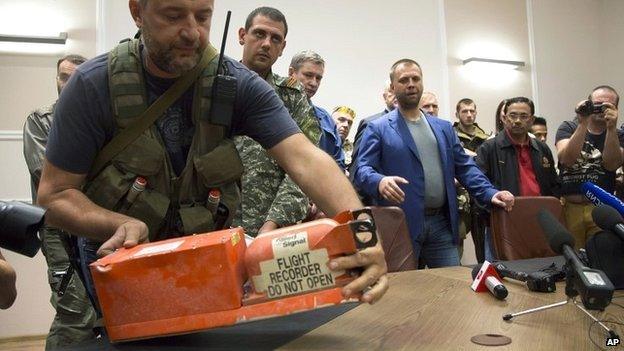
It could take no longer than 24 hours to retrieve information from the black boxes, handed over by the rebels on Monday
Why are the black boxes being examined in the UK? The British Air Accidents Investigation Branch (AIIB) tell me they are one of only two so-called "replay units" in Europe with the necessary equipment to listen to what has been recorded on the cockpit voice recorder. The other is in France.
They have the kit to analyse in minute detail what can be heard in the last few minutes of flight MH17. The information is incredibly sensitive so investigators gather in a sealed room so that only those that should be listening can listen.
There are four speakers on the walls creating a surround sound - anything to help the investigators hear exactly what went on. They may even hear any explosion.
The AIIB won't tell me when they expect to get their hands on the black boxes. But investigators are confident that, depending on the extent of the damage, they can retrieve information from the boxes within 24 hours.

Monitors from the Organization for Security and Co-operation in Europe (OSCE) have been examining the wreckage.
They found that major pieces of the plane had been cut into and that large parts now looked different, a spokesman told the BBC.
New Russia sanctions
European Union foreign ministers have announced they will impose more sanctions against Russia over its alleged backing for the rebels - something Moscow denies.
They said the list of individuals and groups covered by EU sanctions would be broadened and a new list drawn up by EU ambassadors by Thursday at the latest.
"The word is 'cronies': the cronies of [Vladimir] Putin and his clique in the Kremlin are the people who have to bear the pressure," British Foreign Secretary Philip Hammond said after the meeting in Brussels.
Ministers will also ask the European Commission to look at an embargo on new arms sales to Russia and increase punitive measures against Russia in the financial and energy sectors.
Netherlands PM Mark Rutte: "Our main priority remains the return of all of our people"
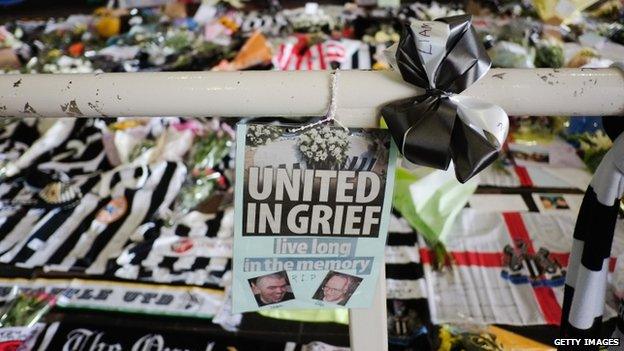
Among those killed were two British fans en route to New Zealand for a Newcastle United game
Both the EU and the US imposed sanctions on Russia following its annexation of Crimea in March and the outbreak of hostilities in eastern Ukraine.
Speaking at a meeting of his security council on Tuesday, Russian President Vladimir Putin said Russia would do "all we can" to exercise influence over the rebels.
But at the same time, he urged the West to put pressure on the Ukrainian government to end the conflict.
"There is a need to call upon the authorities in Kiev to abide by elementary norms of decency, to introduce a ceasefire, at least for a short time for the investigation to go on," he said.
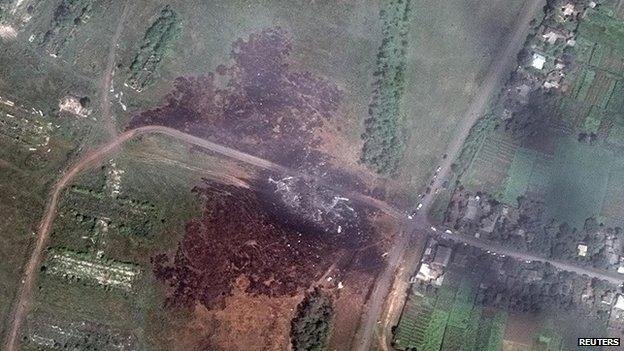
A newly released satellite image shows the crash site in the middle of Grabove in eastern Ukraine
The conflict between Ukrainian government forces and rebels has continued, with reports of fighting round Donetsk and Luhansk.
On Twitter, Ukrainian Interior Minister Arsen Avakov said the army had captured the strategically important town of Severodonetsk, located some 140km (87 miles) from the key rebel stronghold of Donetsk.
Parliament has also approved the call-up of more military reserves and men under 50.
The separatist leader in Luhansk, Valery Bolotov, has ordered a counter-offensive in response to the string of advances by the Ukrainian army.
He said he was taking action in part because of the "critical humanitarian situation in Luhansk caused by its blockade".
Thirteen Ukrainian soldiers were killed over the past 24 hours, a Ukrainian security official said. Three of them died as a bus packed with explosives blew up at a roadblock.
The fighting in eastern Ukraine erupted in April and is believed to have claimed more than 1,000 lives.
